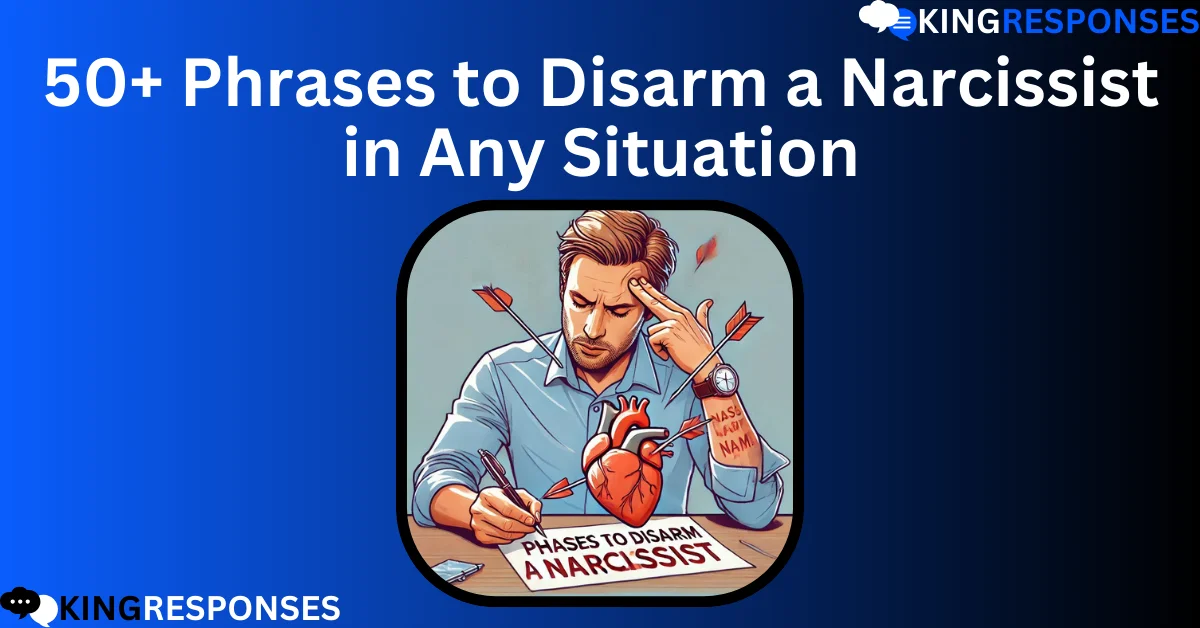Dealing with a narcissist can feel like walking through a maze where the rules change at every turn. Whether it’s a colleague, a friend, or a family member, their behavior can often leave you feeling confused, frustrated, or even drained. But what if you could take back control of these interactions and protect your peace of mind? That’s exactly what this article aims to help you do.
Narcissists often use manipulation, emotional outbursts, or guilt to get their way. They thrive on attention and control, making even simple conversations feel like power struggles. However, with the right approach, you can disarm a narcissist without escalating the situation.
This article will guide you through practical strategies and powerful phrases you can use to navigate conversations with narcissists. We’ll also help you understand their behavior, recognize the signs, and protect yourself from the negative effects of their actions.
By the end, you’ll have a toolkit of responses that will not only neutralize a narcissist’s tactics but also help you stay calm, confident, and in control. Whether you’re dealing with a difficult coworker, a controlling partner, or anyone else who exhibits narcissistic traits, this guide will empower you to handle these situations effectively.
What Is Narcissism?
Narcissism is a term that’s often used to describe people who are overly focused on themselves. They may crave attention, seek admiration, and put their own needs ahead of others. At its core, narcissism is about an inflated sense of self-importance combined with a lack of empathy for others.
But it’s important to understand that not all narcissism is the same. Many people may have narcissistic tendencies without it being a serious issue. For example, someone might occasionally brag about their achievements or struggle to consider other people’s feelings. This is normal to some extent and doesn’t necessarily mean they’re a narcissist.
On the other hand, Narcissistic Personality Disorder (NPD) is a mental health condition. People with NPD have deeply ingrained patterns of thinking and behaving that revolve around their need for admiration and lack of regard for others. Unlike occasional narcissistic behaviors, NPD affects nearly every aspect of a person’s life and relationships. Those with NPD often struggle to form meaningful connections because their actions are driven by their need for control and validation.
How Narcissistic Behavior Affects Relationships
Narcissism can make relationships difficult, whether it’s with a partner, a family member, or a colleague. Here are some ways narcissistic behavior impacts interactions:
- Lack of Empathy: Narcissists may dismiss or ignore other people’s feelings, making others feel unheard or unimportant.
- Manipulative Tactics: They often use guilt, lies, or emotional outbursts to get what they want.
- Power Struggles: Conversations or conflicts can become all about winning, rather than solving problems.
- Emotional Drain: Being around a narcissist can leave you feeling exhausted, confused, or even doubting yourself.
What Are the Signs of a Narcissist?
Recognizing the signs of a narcissist can help you understand their behavior and prepare yourself to deal with them effectively. While everyone may show some of these traits occasionally, narcissists display them consistently in their interactions. Let’s break down the key signs:
1. Lack of Empathy
Narcissists often struggle to care about other people’s feelings. For example, if you’re upset about something, they might brush it off or make the conversation about themselves instead. They rarely take the time to understand what others are going through because they’re too focused on their own needs.
2. Sense of Entitlement
A narcissist believes they deserve special treatment, no matter the situation. They expect others to cater to their needs, give them attention, or agree with their opinions without question. For instance, they might get angry if things don’t go their way or if they don’t receive the admiration they feel they deserve.
3. Manipulative Tendencies
Narcissists are skilled at using people to get what they want. They may play on your emotions, twist the truth, or make you feel guilty to gain control. For example, they might say things like, “After all I’ve done for you, you owe me,” even if their actions were self-serving.
4. Inflated Self-Importance
Narcissists often see themselves as more important or better than others. They might talk endlessly about their achievements, dismiss others’ opinions, or demand constant praise. For instance, they may exaggerate their accomplishments to appear superior in conversations.
Why These Signs Matter
Knowing these behaviors can help you identify when someone might be acting narcissistically. It doesn’t mean you should diagnose them—only a professional can do that—but it can prepare you to respond wisely. When you understand their tendencies, it becomes easier to stay calm and protect yourself from manipulation.
How to Respond to a Narcissist
Interacting with a narcissist can feel like walking a tightrope. They may try to manipulate, provoke, or dominate the conversation, leaving you frustrated or emotionally vulnerable. The key to maintaining control is to respond thoughtfully rather than reacting impulsively. This section provides practical tips and phrases to help you protect yourself, defuse tension, and steer interactions in a more positive direction.
Whether you’re dealing with a narcissist at work, in a relationship, or in your family, these carefully chosen responses can empower you to handle their behavior effectively while preserving your peace of mind.
Short Phrases to Disarm a Narcissist
- “I’m not engaging in this right now.”
- “We’ll talk about this later.”
- “That’s not something I’m interested in.”
- “I don’t have an opinion on that.”
- “I’m not going to argue about this.”
- “It’s not about you right now.”
- “I don’t see it that way.”
- “I’m not going to respond to that.”
- “That’s not my responsibility.”
- “I choose not to engage with this.”
Phrases to Disarm a Narcissist Woman
- “I’m not here to compete.”
- “That’s your perspective, and I respect it.”
- “I’m not trying to win, I’m trying to understand.”
- “Let’s focus on what really matters.”
- “I’m going to let that slide.”
- “I understand how you feel, but I see things differently.”
- “I think it’s best we agree to disagree.”
- “I’m not taking that personally.”
- “I’m not in the mood for drama.”
- “I’m done arguing about this.”
Phrases to Disarm a Narcissist Man
- “I’m not here to please you.”
- “I don’t need validation from anyone.”
- “That’s your take, but I have my own.”
- “I’m not going to fight you on this.”
- “I don’t need your approval.”
- “Let’s not make this about us.”
- “I’ve got this handled.”
- “I’m not giving in to pressure.”
- “I’m not going to argue, it’s pointless.”
- “I’m not interested in your drama.”
Funny Phrases to Disarm a Narcissist
- “Are you auditioning for a role in a soap opera?”
- “You must be the star of your own show.”
- “I need popcorn for this conversation!”
- “Is this the part where I’m supposed to be impressed?”
- “I didn’t realize I was talking to a superhero.”
- “Wow, your confidence is almost as big as your ego.”
- “I didn’t know I was dealing with a world-class performer.”
- “Do you have a mirror in here, or are you just admiring yourself?”
- “Is this your way of winning a gold medal in drama?”
- “You really should have your own TV show.”
Phrases to Establish Boundaries
- “This is where I draw the line.”
- “I won’t accept this kind of treatment.”
- “I need some space to think.”
- “Please respect my boundaries.”
- “I am not tolerating this behavior.”
- “Let’s stick to the facts, no emotions.”
- “I’m not having this conversation right now.”
- “That’s not something I’m comfortable with.”
- “I won’t engage in that type of discussion.”
- “I’m setting a boundary here.”
Phrases to Deflect Manipulation
- “I’m not going to feel guilty for this.”
- “That’s not going to work on me.”
- “I’m not going to fall for that.”
- “I’ve heard your point, and I don’t agree.”
- “I’ve made my decision.”
- “I’m not going to be pushed into something.”
- “That’s not my responsibility to fix.”
- “I’m not being manipulated by that.”
- “I won’t take the blame for this.”
- “I’m not playing this game.”
Phrases to Maintain Emotional Distance
- “I’m not emotionally invested in this.”
- “This isn’t something I’m getting worked up over.”
- “I’m not going to let this affect me.”
- “I’m choosing to stay neutral.”
- “I’m not letting you get under my skin.”
- “I don’t feel the need to explain myself.”
- “I don’t take things personally.”
- “I’m distancing myself from this situation.”
- “This is not something I’m emotionally attached to.”
- “I prefer to keep my emotions out of this.”
Phrases to Foster Positive Interactions
- “Let’s keep this respectful.”
- “I’m open to hearing your thoughts.”
- “Let’s work together to solve this.”
- “What’s the best way we can move forward?”
- “I think we can find a solution together.”
- “We both want the best outcome here.”
- “Let’s focus on how we can make this better.”
- “I value your input, but I see things differently.”
- “I want to understand your point of view.”
- “I think we can agree to disagree.”
Phrases to End Toxic Interactions
- “I’m done discussing this with you.”
- “This conversation is over.”
- “I’m not engaging in this any further.”
- “I’ve had enough of this discussion.”
- “I’m choosing not to continue this.”
- “Let’s put an end to this now.”
- “This isn’t going anywhere, so I’m leaving.”
- “I’ve said all I need to say.”
- “I’m stepping away from this.”
- “This interaction is over, and I’m moving on.”
How to Tell if Someone Is Narcissistic
While it’s not always easy to spot a narcissist right away, there are clear patterns of behavior that can help you identify if someone is narcissistic. Pay attention to how they treat others and respond in different situations. Here are some ways to tell if someone might be narcissistic:
1. They Make Everything About Themselves
Narcissists tend to dominate conversations and shift the focus to their own experiences, achievements, or problems. If you’re sharing something important, they might interrupt or dismiss it, steering the discussion back to them.
2. They Exaggerate Their Achievements
A narcissist often boasts about their accomplishments, making them sound larger than life. They may downplay others’ contributions to make themselves appear more impressive. For instance, they might claim to have single-handedly succeeded in a team project.
3. They Struggle to Handle Criticism
Even gentle feedback can trigger a strong reaction. Narcissists may lash out, deny any fault, or try to make you feel guilty for pointing out an issue. This defensiveness stems from their fragile self-esteem.
4. They Seek Constant Validation
Narcissists crave admiration and approval. They might fish for compliments or feel upset if they don’t receive enough attention. For example, they could repeatedly ask, “What do you think about what I did?” or sulk if they feel ignored.
5. They Show Little or No Empathy
If someone struggles to connect with other people’s feelings or dismisses their emotions, it can be a sign of narcissism. For example, if a friend shares they’re going through a tough time, a narcissist might respond with indifference or shift the topic back to themselves.
6. They Exploit Others
Narcissists often view relationships as a way to serve their own needs. They might take advantage of others’ kindness or manipulate situations to benefit themselves without considering how it affects those around them.
How Can a Narcissist Negatively Impact Your Life?
Dealing with a narcissist can be more than just frustrating—it can have a lasting effect on your emotional well-being, relationships, and even your confidence. Their behavior often creates unhealthy dynamics that leave others feeling drained, unworthy, or manipulated. Let’s explore how a narcissist’s actions can negatively impact your life:
1. Emotional Exhaustion
Interacting with a narcissist can feel like a one-sided effort. They demand constant attention, validation, and support while offering little in return. Over time, this imbalance can leave you emotionally drained and mentally fatigued.
2. Damage to Self-Esteem
Narcissists often use criticism or blame to shift focus away from their own flaws. This can make you doubt yourself, question your abilities, or feel as though you’re never good enough. For instance, they might say things like, “You’re too sensitive,” or dismiss your opinions entirely.
3. Strained Relationships
Whether it’s with family, friends, or coworkers, a narcissist’s need for control and lack of empathy can cause significant tension. They may create conflict, isolate you from others, or make relationships feel like constant power struggles.
4. Manipulation and Gaslighting
Narcissists are skilled at twisting reality to serve their own interests. They might deny things they’ve said or done, leaving you questioning your own memory or judgment. This tactic, known as gaslighting, can severely impact your mental health.
5. Limited Personal Growth
Being around a narcissist often means walking on eggshells to avoid triggering their outbursts or criticism. This fear can prevent you from expressing yourself, setting boundaries, or pursuing opportunities that matter to you.
6. Increased Stress and Anxiety
Constantly dealing with manipulation, unpredictability, and emotional outbursts can lead to heightened stress and anxiety. You may find yourself feeling tense even when they’re not around, as their behavior creates a lingering sense of unease.
Understanding Narcissistic Behavior
To handle narcissists effectively, it’s important to understand why they act the way they do. Narcissistic behavior is often driven by deep insecurities masked by an inflated sense of self-importance. While their actions may seem deliberate or manipulative, they often stem from a need to protect their fragile self-esteem.
Why Do Narcissists Act the Way They Do?
- Fear of Vulnerability
Narcissists have a hard time accepting their flaws or weaknesses. To avoid feeling exposed, they create a persona of perfection, which they work tirelessly to maintain. - Need for Validation
They constantly seek external validation to feel good about themselves. Compliments, admiration, and praise act as fuel for their self-esteem, which can quickly falter without it. - Lack of Emotional Awareness
Narcissists often struggle to connect with their own emotions, let alone the emotions of others. This lack of empathy can make them seem cold or uncaring.
Key Traits of Narcissistic Behavior
- Projection: Narcissists project their own insecurities onto others. For example, if they feel inadequate, they may accuse you of being incompetent.
- Blame Shifting: They rarely take responsibility for their actions, preferring to place the blame on someone else.
- Overreaction to Criticism: Even constructive feedback can trigger anger, denial, or defensiveness.
- Grandiosity: Narcissists often exaggerate their abilities, achievements, or importance to maintain their image of superiority.
Can Narcissists Change?
While change is possible, it’s rare for a narcissist to acknowledge their behavior or seek help. True change requires self-awareness, a willingness to reflect, and consistent effort. Unfortunately, many narcissists lack the motivation to address their issues, as they don’t see their behavior as a problem.
Tips for Handling Conversations with Narcissists
Engaging in conversations with a narcissist can be challenging, but with the right strategies, you can maintain control and avoid being manipulated. These tips will help you manage interactions effectively while preserving your emotional well-being.
1. Keep Your Cool
Narcissists may try to provoke you to gain control of the conversation. Stay calm and composed, even if their words are hurtful or frustrating. Reacting emotionally only gives them the upper hand.
2. Set Clear Boundaries
Narcissists often push limits to get what they want. Be firm and consistent in setting boundaries. For example, if they’re monopolizing your time, you might say, “I need to focus on something else right now, but we can talk later.”
3. Avoid Defending Yourself Excessively
Narcissists thrive on arguments and may twist your words to make you feel guilty. Instead of over-explaining or defending yourself, stick to concise responses. For instance, respond with a neutral phrase like, “That’s your opinion.”
4. Don’t Take the Bait
Narcissists might make inflammatory statements to get a reaction. Instead of engaging, respond with calm indifference. For example, if they say something provocative, you can reply with, “I hear what you’re saying,” and move on.
5. Use Empathy Strategically
While narcissists lack empathy, showing a bit of understanding can sometimes defuse tense situations. Phrases like, “I see how that’s important to you,” can help redirect the conversation without feeding their ego.
6. Focus on Facts, Not Emotions
When discussing an issue, stick to factual observations rather than emotional appeals. Narcissists are less likely to respond positively to feelings but may react to clear, logical points.
7. Practice the “Gray Rock” Method
This technique involves being as uninteresting as possible to discourage their attempts to manipulate or provoke you. Keep your responses short and neutral, avoiding emotional engagement. For instance, reply with, “Okay,” or, “Noted,” and steer the conversation away.
8. Know When to Walk Away
Sometimes, the best response is to disengage. If a conversation becomes toxic or one-sided, excuse yourself politely. For example, you might say, “I need to step away for a bit. Let’s continue later.”
How to Respond to a Narcissist Playing Victim
When a narcissist plays the victim, they often use guilt and pity to manipulate others into giving in. To counteract this behavior:
Acknowledge Their Feelings Without Validation
- Recognize their emotions without agreeing with their perspective.
- Example Phrase: “I understand that you feel upset, but I see things differently.”
Stay Objective and Focused on Facts
- Avoid getting drawn into emotional narratives. Stick to the core issue.
- Example Phrase: “Let’s focus on what actually happened instead of how it’s being perceived.”
Avoid Taking Responsibility for Their Feelings
- Make it clear that their emotions are not your responsibility.
- Example Phrase: “I’m sorry you feel that way, but this is not something I can fix for you.”
Set Clear Boundaries
- Politely but firmly refuse to engage in guilt-tripping or self-pity.
- Example Phrase: “I’m happy to discuss solutions, but I won’t revisit past grievances.”
What Are the Four Words You Should Never Say to a Narcissist?
Certain phrases can escalate conflicts with a narcissist or feed their need for control. Here are four words or phrases to avoid and why:
- “You’re Wrong”
- Directly challenging their ego often provokes defensiveness or hostility. Instead, use phrases like: “I see it differently.”
- “You’re Selfish”
- Labeling their behavior can lead to denial or counterattacks. Instead, focus on how their actions affect you: “I feel unsupported in this situation.”
- “Calm Down”
- Telling a narcissist to calm down often inflames their emotions further. Opt for: “Let’s take a moment to cool off and revisit this.”
- “You Always/You Never”
- Absolutist statements can lead to defensiveness or arguments. Be specific and constructive instead: “In this instance, I felt disregarded.”
Avoiding these phrases helps you keep interactions constructive and reduces unnecessary conflict.
How Do You Disarm a Narcissist in a Conversation?
Disarming a narcissist requires strategies that neutralize their manipulative tactics while preserving your own boundaries:
- Respond with Neutrality
- Narcissists often bait others into emotional reactions. Use neutral phrases to avoid escalating tension.
- Example Phrase: “That’s interesting. Can you tell me more about that?”
- Deflect Personal Attacks
- If the conversation turns critical, redirect it toward the issue rather than engaging with their criticism.
- Example Phrase: “Let’s focus on solving the problem instead of placing blame.”
- Set Boundaries Through Phrases
- Clearly express limits to their behavior.
- Example Phrase: “I’m willing to discuss this, but not in this manner.”
- Keep the Conversation Solution-Focused
- Redirect attention to actionable steps rather than emotional grievances.
- Example Phrase: “What would you like to achieve from this discussion?”
- Acknowledge Without Agreeing
- Validate their feelings without conceding to their perspective.
- Example Phrase: “I hear what you’re saying, but I see it differently.”
Conclusion
Dealing with narcissistic individuals can be an emotionally draining experience. However, by understanding narcissistic behavior and using effective phrases to disarm a narcissist, you can regain control of your interactions and protect your emotional well-being.
The key takeaways from this article are:
- Recognize the signs of narcissistic behavior, such as lack of empathy, manipulation, and inflated self-importance.
- Understand the difference between narcissistic tendencies and Narcissistic Personality Disorder (NPD).
- Learn strategies to handle arguments, respond to manipulative tactics, and maintain healthy boundaries.
- Utilize specific phrases tailored to different scenarios to disarm narcissists effectively, whether in casual conversations or high-stress arguments.
Remember, the goal isn’t to “win” against a narcissist but to maintain your composure and protect your emotional health. With the right knowledge and communication tools, you can foster a sense of control and reduce the negative impact narcissistic behavior may have on your life.
Managing these interactions is a challenge, but it’s one you can face with confidence. By practicing empathy for yourself and maintaining firm boundaries, you empower yourself to navigate even the most difficult relationships with resilience and clarity.
FAQs
Can Narcissists Change Their Behavior Over Time?
While change is possible, it typically requires professional therapy and a willingness on their part to address their behavior.
How Can I Stay Calm When Dealing with a Narcissist?
Focus on deep breathing, maintain emotional distance, and remind yourself not to take their words personally.
What Should I Do If a Narcissist Ignores My Boundaries?
Reiterate your boundaries firmly and, if necessary, distance yourself from the individual to protect your well-being.
Is It Possible to Have a Healthy Relationship with a Narcissist?
Healthy relationships are challenging with a narcissist. Establishing clear boundaries and seeking professional advice can help manage expectations.
Are Narcissists Aware of Their Behavior?
Some are aware, but many lack self-awareness. Those with higher self-awareness might use their behavior intentionally to manipulate others.




